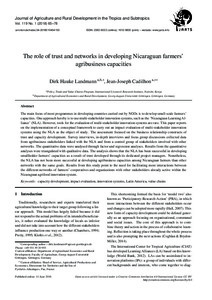Aufsatz

The role of trust and networks in developing Nicaraguan farmers’ agribusiness capacities
Abstract
The main focus of most programmes in developing countries carried out by NGOs is to develop small-scale farmers’ capacities. One approach hereby is to use multi-stakeholder innovation systems, such as the ‘Nicaraguan Learning Alliance’ (NLA). However, tools for the evaluation of multi-stakeholder innovation systems are rare. This paper reports on the implementation of a conceptual framework to carry out an impact evaluation of multi-stakeholder innovation systems using the NLA as the object of study. The assessment focused on the business relationship constructs of trust and capacity development. Survey interviews, in-depth interviews and focus group discussions collected data from agribusiness stakeholders linked with the NLA and from a control group of stakeholders involved with other networks. The quantitative data were analysed through factor and regression analyses. Results from the quantitative analyses were triangulated with qualitative data. The analysis shows that the NLA has been successful in developing smallholder farmers’ capacities as a result of trust developed through its dedicated project managers. Nonetheless, the NLA has not been more successful at developing agribusiness capacities among Nicaraguan farmers than other networks with the same goals. Results from this study point to the need for facilitating more interactions between the different networks of farmers’ cooperatives and organisations with other stakeholders already active within the Nicaraguan agrifood innovation system.
Citation
In: Journal of Agriculture and Rural Development in the Tropics and Subtropics. Kassel : Kassel University Press. - Vol. 119, No. 1 (2018) S. 65-78Collections
Vol 119, No 1 (2018) (Journal of Agriculture and Rural Development in the Tropics and Subtropics (JARTS))Citation
@article{urn:nbn:de:hebis:34-2018010454150,
author={Landmann, Dirk Hauke and Cadilhon, Jean-Joseph},
title={The role of trust and networks in developing Nicaraguan farmers’ agribusiness capacities},
year={2018}
}
0500 Oax 0501 Text $btxt$2rdacontent 0502 Computermedien $bc$2rdacarrier 1100 2018$n2018 1500 1/eng 2050 ##0##urn:nbn:de:hebis:34-2018010454150 3000 Landmann, Dirk Hauke 3010 Cadilhon, Jean-Joseph 4000 The role of trust and networks in developing Nicaraguan farmers’ agribusiness capacities / Landmann, Dirk Hauke 4030 4060 Online-Ressource 4085 ##0##=u http://nbn-resolving.de/urn:nbn:de:hebis:34-2018010454150=x R 4204 \$dAufsatz 4170 7136 ##0##urn:nbn:de:hebis:34-2018010454150
<resource xsi:schemaLocation="http://datacite.org/schema/kernel-2.2 http://schema.datacite.org/meta/kernel-2.2/metadata.xsd"> 2018-06-19T08:45:51Z 2018-06-19T08:45:51Z 2018-06-11 1612-9830 2363-6033 urn:nbn:de:hebis:34-2018010454150 http://hdl.handle.net/123456789/2018010454150 eng Kassel University Press Urheberrechtlich geschützt https://rightsstatements.org/page/InC/1.0/ capacity development impact evaluation innovation systems Latin America value chains 630 The role of trust and networks in developing Nicaraguan farmers’ agribusiness capacities Aufsatz The main focus of most programmes in developing countries carried out by NGOs is to develop small-scale farmers’ capacities. One approach hereby is to use multi-stakeholder innovation systems, such as the ‘Nicaraguan Learning Alliance’ (NLA). However, tools for the evaluation of multi-stakeholder innovation systems are rare. This paper reports on the implementation of a conceptual framework to carry out an impact evaluation of multi-stakeholder innovation systems using the NLA as the object of study. The assessment focused on the business relationship constructs of trust and capacity development. Survey interviews, in-depth interviews and focus group discussions collected data from agribusiness stakeholders linked with the NLA and from a control group of stakeholders involved with other networks. The quantitative data were analysed through factor and regression analyses. Results from the quantitative analyses were triangulated with qualitative data. The analysis shows that the NLA has been successful in developing smallholder farmers’ capacities as a result of trust developed through its dedicated project managers. Nonetheless, the NLA has not been more successful at developing agribusiness capacities among Nicaraguan farmers than other networks with the same goals. Results from this study point to the need for facilitating more interactions between the different networks of farmers’ cooperatives and organisations with other stakeholders already active within the Nicaraguan agrifood innovation system. open access In: Journal of Agriculture and Rural Development in the Tropics and Subtropics. Kassel : Kassel University Press. - Vol. 119, No. 1 (2018) S. 65-78 Landmann, Dirk Hauke Cadilhon, Jean-Joseph Gedruckte Ausg. im Verlag Kassel Univ. Press (www.upress.uni-kassel.de) erschienen. </resource>
The following license files are associated with this item:
Urheberrechtlich geschützt

